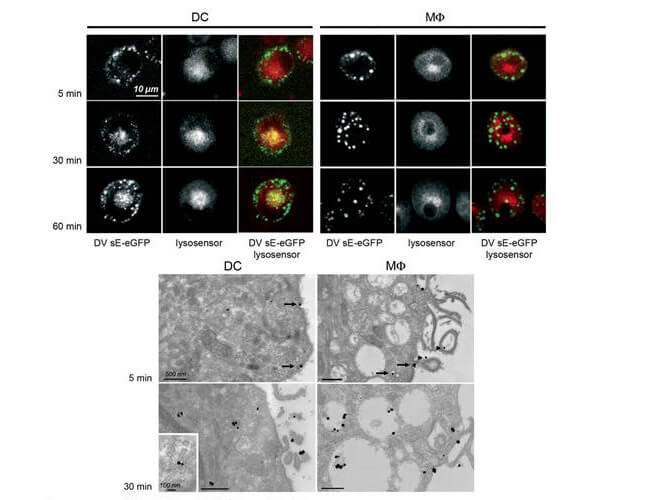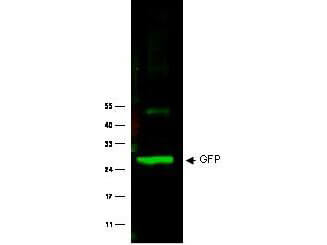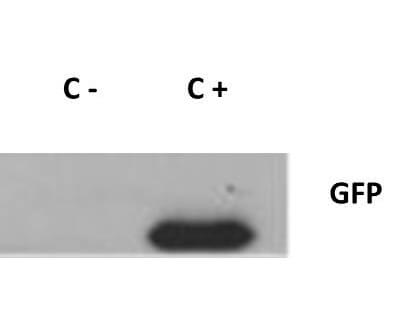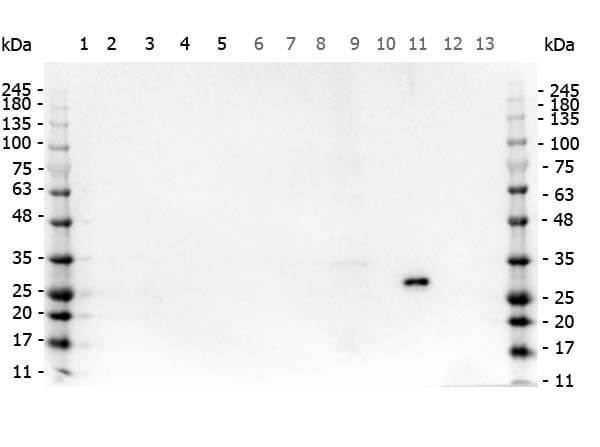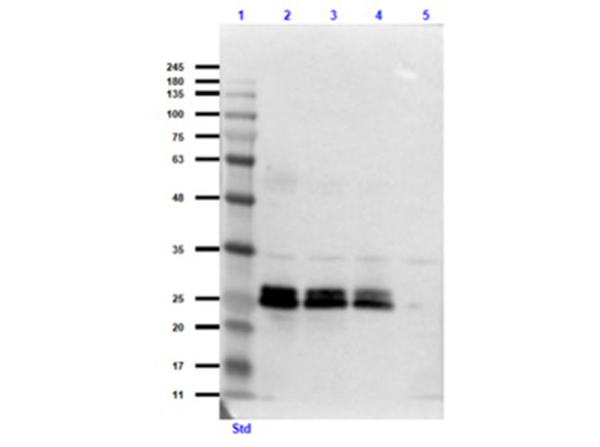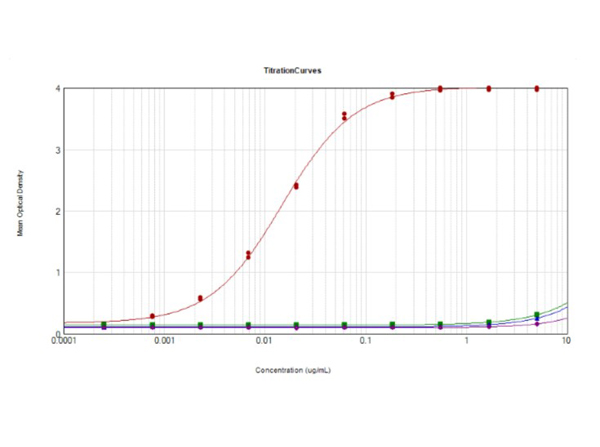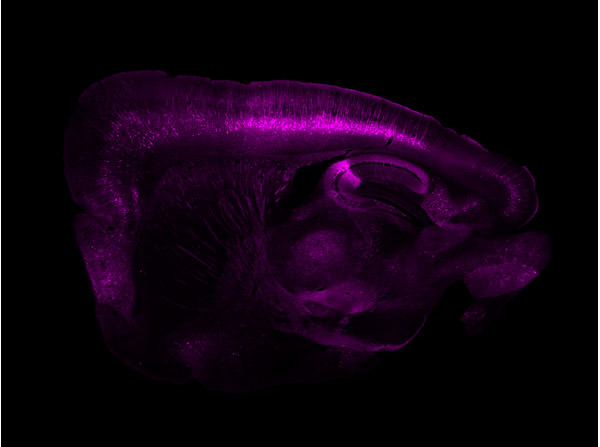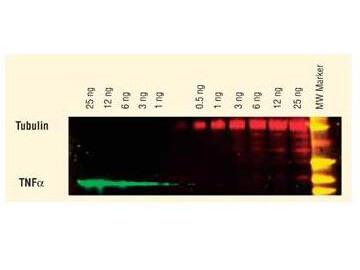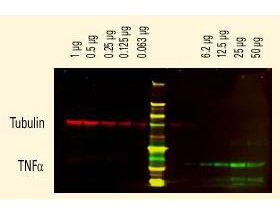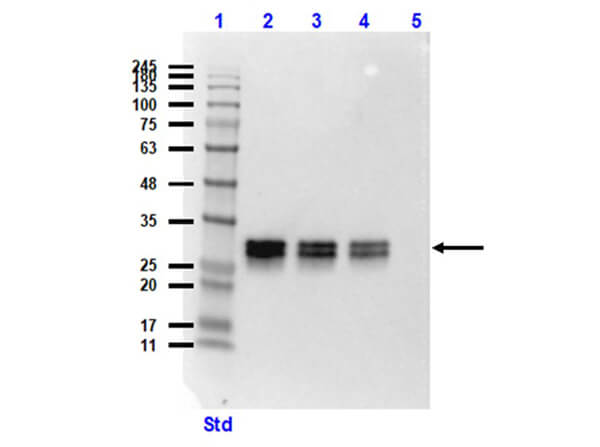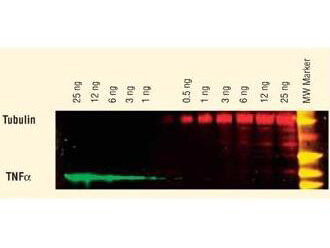GFP Antibody
Rabbit Polyclonal
100 References
600-401-215S
600-401-215
600-401-215L
25 µL
100 µg
1 mg
Liquid (sterile filtered)
Liquid (sterile filtered)
Liquid (sterile filtered)
WB, ELISA, IHC, IF, FC, EM, IP, Microarray, Multiplex, Other, Purification
GFP, eGFP, rGFP, RS-GFP, S65T-GFP, YFP
Rabbit
Shipping info:
$50.00 to US & $70.00 to Canada for most products. Final costs are calculated at checkout.
Product Details
Anti-GFP (RABBIT) Antibody - 600-401-215
rabbit anti-GFP antibody, Green Fluorescent Protein, GFP antibody, Green Fluorescent Protein antibody, EGFP, enhanced Green Fluorescent Protein, Aequorea victoria, Jellyfish
Rabbit
Polyclonal
IgG
Target Details
GFP, eGFP, rGFP, RS-GFP, S65T-GFP, YFP
Recombinant Protein
The immunogen is a Green Fluorescent Protein (GFP) fusion protein corresponding to the full length amino acid sequence (246aa) derived from the jellyfish Aequorea victoria.
Anti-GFP antibody was prepared from monospecific antiserum by immunoaffinity chromatography using Green Fluorescent Protein (Aequorea victoria) coupled to agarose beads followed by solid phase adsorption(s) to remove any unwanted reactivities. Assay by immunoelectrophoresis resulted in a single precipitin arc against anti-Rabbit Serum and purified and partially purified Green Fluorescent Protein (Aequorea victoria). No reaction was observed against Human, Mouse or Rat serum proteins.
P42212 - UniProtKB
Application Details
ELISA, WB
EM, FC, IF, IHC, IP, Microarray, Other, Purification, Multiplex
- View References
Anti-GFP antibody is designed to detect GFP and its variants. GFP antibody has been tested by western blot and ELISA. This product can be used to detect GFP by ELISA (sandwich or capture) for the direct binding of antigen and recognizes wild type, recombinant and enhanced forms of GFP. Biotin conjugated polyclonal anti-GFP used in a sandwich ELISA is well suited to titrate GFP in solution using this antibody in combination with Rockland's monoclonal anti-GFP (600-301-215) using either form of the antibody as the capture or detection antibodies. However, use the monoclonal form only for the detection of wild type or recombinant GFP as this form does not sufficiently detect 'enhanced' GFP. The detection antibody is typically conjugated to biotin and subsequently reacted with streptavidin conjugated HRP (code # S000-03). Fluorochrome conjugated polyclonal anti-GFP can be used to detect GFP by immunofluorescence microscopy in prokaryotic (E.coli) and eukaryotic (CHO cells) expression systems and can detect GFP containing inserts. Significant amplification of signal is achieved using fluorochrome conjugated polyclonal anti-GFP relative to the fluorescence of GFP alone. For immunoblotting use either alkaline phosphatase or peroxidase conjugated polyclonal anti-GFP to detect GFP or GFP containing proteins on western blots. Optimal titers for applications should be determined by the researcher.
Formulation
1.25 mg/mL by UV absorbance at 280 nm
0.02 M Potassium Phosphate, 0.15 M Sodium Chloride, pH 7.2
0.01% (w/v) Sodium Azide
None
Shipping & Handling
Dry Ice
Store Anti-GFP Antibody at -20° C prior to opening. Aliquot contents and freeze at -20° C or below for extended storage. Avoid cycles of freezing and thawing. Centrifuge product if not completely clear after standing at room temperature. GFP antibody is stable for several weeks at 4° C as an undiluted liquid. Dilute only prior to immediate use.
Expiration date is one (1) year from date of receipt.
Green Fluorescent Protein (GFP) is a 27 kDa protein produced from the jellyfish Aequorea victoria, which emits green light (emission peak at a wavelength of 509nm) when excited by blue light. GFP is an important tool in cell biology research. GFP is widely used enabling researchers to visualize and localize GFP-tagged proteins within living cells without the need for chemical staining. GFP Antibody is ideal for Cell Biology, Neuroscience and Cancer research.
Vukovic D et al. (2024). Protein degradation kinetics measured by microinjection and live-cell fluorescence microscopy. Sci Rep.
Applications
ChIP
Lee C et al. (2024). Global and local functions of the Fused kinase ortholog CdaH in intracellular patterning in Tetrahymena. J Cell Sci.
Applications
IF, Confocal Microscopy
Müller L et al. (2023). Protocol to determine the subcellular localization of protein interactions in murine keratinocytes. STAR Protoc.
Applications
IP, Co-IP
Kimoto A et al. (2023). Exosomes in ascites from patients with human pancreatic cancer enhance remote metastasis partially through endothelial-mesenchymal transition. Pancreatology.
Applications
IHC, ICC, Histology
Yang HJ et al. (2023). A nuclear pore complex-associated regulation of SUMOylation in meiosis Genes Cells.
Applications
IP, Co-IP; WB, IB, PCA
Chung C et al. (2023). The fidelity of transcription in human cells. Proc Natl Acad Sci U S A.
Applications
IF, Confocal Microscopy
Garcia K et al. (2023). The putative transporter MtUMAMIT14 participates in nodule formation in Medicago truncatula. Sci Rep.
Applications
WB, IB, PCA
Zhang W et al. (2023). A Bioresponsive Genetically Encoded Antimicrobial Crystal for the Oral Treatment of Helicobacter Pylori Infection. Adv Sci (Weinh).
Applications
WB, IB, PCA
Walton K et al. (2023). Site-specific phosphorylations of the Arf activator GBF1 differentially regulate GBF1 function in Golgi homeostasis and secretion versus cytokinesis. Sci Rep.
Applications
IF, Confocal Microscopy; WB, IB, PCA
Chaubal A et al. (2023). Coordinated expression of replication-dependent histone genes from multiple loci promotes histone homeostasis in Drosophila. Mol Biol Cell.
Applications
IF, Confocal Microscopy
Martinez AP et al. (2023). Pcdh19 mediates olfactory sensory neuron coalescence during postnatal stages and regeneration. iScience.
Applications
IF, Confocal Microscopy
Müller L et al. (2023). Plakophilin 3 facilitates G1/S phase transition and enhances proliferation by capturing RB protein in the cytoplasm and promoting EGFR signaling. Cell Rep.
Applications
IP, Co-IP
Navyasree KV et al. (2023). Cholesterol regulates insulin-induced mTORC1 signaling. J Cell Sci.
Applications
WB, IB, PCA
Sun Y et al. (2023). Focal-adhesion kinase regulates the sialylation of N-glycans via the PI4KIIα-PI4P pathway. J Biol Chem.
Applications
WB, IB, PCA
Legal T et al. (2023). CEP104/FAP256 and associated cap complex maintain stability of the ciliary tip. J Cell Biol.
Applications
IF, Confocal Microscopy
Frasch M et al. (2023). The RNF220 domain nuclear factor Teyrha-Meyrha (Tey) regulates the migration and differentiation of specific visceral and somatic muscles in Drosophila. Development.
Applications
IF, Confocal Microscopy
Yshii, L et el. (2022). Astrocyte-targeted gene delivery of interleukin 2 specifically increases brain-resident regulatory T cell numbers and protects against pathological neuroinflammation. Nature Immunology
Applications
IF, Confocal Microscopy
Lin, TY et al. (2022). Inducible and tissue-specific cell labeling in Cre-ERT2 transgenic Xenopus lines. Development, Growth & Differentiation
Applications
IF, Confocal Microscopy
Zhang, L et al. (2022). Virally Mediated Connexin 26 Expression in Postnatal Scala Media Significantly and Transiently Preserves Hearing in Connexin 30 Null Mice. Frontiers in Cell and Developmental Biology
Applications
IF, Confocal Microscopy
Rose M et al. (2022). Twist regulates Yorkie activity to guide lineage reprogramming of syncytial alary muscles. Cell Rep.
Applications
IF, Confocal Microscopy
Haraguchi T et al. (2022). Transfected plasmid DNA is incorporated into the nucleus via nuclear envelope reformation at telophase. Commun Biol.
Applications
IF, Confocal Microscopy
Fan Y et al. (2022). Cullin 4b Complex Targets IRGM1 to Regulate Intestinal Stem Cell Stemness and Niche. Cell Death Differ.
Applications
IF, Confocal Microscopy
Asakawa H et al. (2022). Fission yeast Ish1 and Les1 interact with each other in the lumen of the nuclear envelope. Genes Cells.
Applications
Immuno-EM; WB, IB, PCA
Li Y et al. (2022). Loss of Acta2 in cardiac fibroblasts does not prevent the myofibroblast differentiation or affect the cardiac repair after myocardial infarction. J Mol Cell Cardiol.
Applications
IHC, ICC, Histology
Philips T et al. (2021). MCT1 Deletion in Oligodendrocyte Lineage Cells Causes Late-Onset Hypomyelination and Axonal Degeneration. Cell Rep.
Applications
IHC, ICC, Histology
Ryder BD et al. (2021). Regulatory inter-domain interactions influence Hsp70 recruitment to the DnaJB8 chaperone. Nat Commun.
Applications
WB, IB, PCA
Wittig, KA et al. (2021). The CRL4DTL E3 ligase induces degradation of the DNA replication initiation factor TICRR/TRESLIN specifically during S phase. Nucleic Acids Research
Applications
FC, FACS, FLOW
Buglino, JA et al. (2021). Integrated sensing of host stresses by inhibition of a cytoplasmic two-component system controls M. tuberculosis acute lung infection. ELife
Applications
WB, IB, PCA
Li, Y et al. (2021). Genetic analysis of the septal peptidoglycan synthase FtsWI complex supports a conserved activation mechanism for SEDS-bPBP complexes. PloS Genetics
Applications
WB, IB, PCA
Wang, Q et al. (2021). The Extracellular Superoxide Dismutase Sod5 From Fusarium oxysporum Is Localized in Response to External Stimuli and Contributes to Fungal Pathogenicity. Frontiers in Plant Science
Applications
WB, IB, PCA
Lin TY et al. (2021). Fibroblast dedifferentiation as a determinant of successful regeneration. Dev Cell.
Applications
IF, Confocal Microscopy
Fu Gontong et al. (2021). Metabolic control of TFH cells and humoral immunity by phosphatidylethanolamine. Nature.
Applications
IF, Confocal Microscopy
Ulbricht C et al. (2021). Intravital quantification reveals dynamic calcium concentration changes across B cell differentiation stages. Elife.
Applications
LCI-S, SMART, FRET
Poling ME et al. (2021). Atg8 licenses adipokine nuclear exit. bioRxiv Preprint
Applications
EIA, ELISA
Hall ET et al. (2021). Cytoneme delivery of Sonic Hedgehog from ligand-producing cells requires Myosin 10 and a Dispatched-BOC/CDON co-receptor complex. Elife.
Applications
WB, IB, PCA
Zhang X et al. (2021). Single cell transcriptomic analyses reveal the impact of bHLH factors on human retinal organoid development. Front Cell Dev Biol.
Applications
IHC, ICC, Histology
Javkar T et al. (2020). Slow cycling intestinal stem cell and Paneth cell responses to Trichinella spiralis infection. Parasitol Int.
Applications
IHC, ICC, Histology
Jiwani T et al. (2020). Suppressor of fused controls cerebellum granule cell proliferation by suppressing Fgf8 and spatially regulating Gli proteins. Development.
Applications
IHC, ICC, Histology
Anton Z et al. (2020). Variability in mitochondrial import, mitochondrial health and mtDNA copy number using Type II and Type V CRISPR effectors. J Cell Sci
Applications
Immuno-EM
Petrov K et al. (2020). Distinct cation gradients power cholesterol transport at different key points in the Hedgehog signaling pathway. Dev Cell
Applications
Undefined
Ma Q et al. (2020). Oligodendrocyte-specific Argonaute profiling identifies microRNAs associated with experimental autoimmune encephalomyelitis. J Neuroinflammation.
Applications
IHC, ICC, Histology; IP, Co-IP
Ghosh S et al. (2020). β-Coronaviruses use lysosomes for egress instead of the biosynthetic secretory pathway. Cell.
Applications
Immuno-EM
Crochemore C et al. (2019). CSB promoter downregulation via histone H3 hypoacetylation is an early determinant of replicative senescence. Nat Commun
Applications
WB, IB, PCA
Rueda EM, Hall BM, Hill MC, et al. (2019). The Hippo Pathway Blocks Mammalian Retinal Müller Glial Cell Reprogramming. Cell Rep.
Applications
IP, Co-IP
Rueda EM, Hall BM, Hill MC, et al. (2019). The Hippo Pathway Blocks Mammalian Retinal Müller Glial Cell Reprogramming. Cell Rep.
Applications
IF, Confocal Microscopy
Asakawa H et al. (2019). Asymmetrical localization of Nup107-160 subcomplex components within the nuclear pore complex in fission yeast. PLoS Genet.
Applications
Ab Immobilization; Immuno-EM; WB, IB, PCA
Ferrari M et al. (2019). Shigella promotes major alteration of gut epithelial physiology and tissue invasion by shutting off host intracellular transport. Proc Natl Acad Sci USA
Applications
IF, Confocal Microscopy
Choi S et al. (2019). The Salmonella virulence protein MgtC promotes phosphate uptake inside macrophages. Nat Commun.
Applications
WB, IB, PCA
Jiang YY et al. (2019). LF4/MOK and a CDK-related kinase regulate the number and length of cilia in Tetrahymena. PLoS Genet.
Applications
WB, IB, PCA
Zhang Z et al. (2019). Fis1 deficiencies differentially affect mitochondrial quality in skeletal muscle. Mitochondrion.
Applications
Immuno-EM
Wei J et al. (2019). Targeting REGNASE-1 programs long-lived effector T cells for cancer therapy. Nature.
Applications
IF, Confocal Microscopy
Brito, C et al. (2019). Perfringolysin O-Induced Plasma Membrane Pores Trigger Actomyosin Remodeling and Endoplasmic Reticulum Redistribution. Toxins
Applications
TEM
Liu, W et al. (2019). Alp7-Mto1 and Alp14 synergize to promote interphase microtubule regrowth from the nuclear envelope. Journal of Molecular Cell Biology
Applications
WB, IB, PCA; IP, Co-IP
Ebert et al. (2018). Identification of essential amino acids for glucose transporter 5 (GLUT5)-mediated fructose transport. Journal of Biological Chemistry
Applications
WB, IB, PCA
Tsuchiya et al. (2018). p62/SQSTM1 promotes rapid ubiquitin conjugation to target proteins after endosome rupture during xenophagy. FEBS Open Bio
Applications
WB, IB, PCA
Widowati et al. (2018). Functional characterization of DYRK1A missense variants associated with a syndromic form of intellectual deficiency and autism. Biology Open
Applications
WB, IB, PCA
Laue et al. (2018). Intracellular membranes of bacterial endospores are reservoirs for spore core membrane expansion during spore germination. Scientific Reports
Applications
TEM
Jo et al. (2018). Type 2 deiodinase polymorphism causes ER stress and hypothyroidism in the brain. Journal of Clinical Investigation
Applications
IF, Confocal Microscopy
de Beer et al. (2018). A small protein probe for correlated microscopy of endogenous proteins. Histochemistry and Cell Biology
Applications
Immuno-EM
Widowati et al. (2018). Mutational analysis of two residues in the DYRK homology box of the protein kinase DYRK1A. BMC Research Notes
Applications
IP, Co-IP; WB, IB, PCA
Liebmann et al. (2018). Regulation of Neuronal Na,K-ATPase by Extracellular Scaffolding Proteins. International Journal of Molecular Sciences
Applications
IHC, ICC, Histology
Hirano Y et al. (2018). Lem2 is retained at the nuclear envelope through its interaction with Bqt4 in fission yeast. Genes Cells.
Applications
WB, IB, PCA
Bao XX et al. (2018). Exportin Crm1 is repurposed as a docking protein to generate microtubule organizing centers at the nuclear pore. Elife.
Applications
Immuno-EM
Schwartz B et al. (2018). Diversification of heart progenitor cells by EGF signaling and differential modulation of ETS protein activity. Elife.
Applications
IF, Confocal Microscopy; Multiplex Assay
Joseph DB et al. (2018). In vivo replacement of damaged bladder urothelium by Wolffian duct epithelial cells. Proc Natl Acad Sci USA
Applications
IF, Confocal Microscopy
Iwamoto et al. (2017). Compositionally distinct nuclear pore complexes of functionally distinct dimorphic nuclei in the ciliate Tetrahymena. Journal of Cell Science
Applications
IP, Co-IP
Rajan et al. (2017). A Mechanism Coupling Systemic Energy Sensing to Adipokine Secretion. Developmental Cell
Applications
E, EIA
Wefers et al. (2017). Synaptic input as a directional cue for migrating interneuron precursors. Development
Applications
IHC, ICC, Histology; Immuno-EM
Schäfer et al. (2017). Mode of Surgical Injury Influences the Source of Urothelial Progenitors during Bladder Defect Repair. Stem Cell Reports
Applications
IHC, ICC, Histology; Multiplex Assay
Janssen AF et al. (2017). Myosin-V Induces Cargo Immobilization and Clustering at the Axon Initial Segment. Front Cell Neurosci.
Applications
IF, Confocal Microscopy
Mitsuhashi K et al. (2017). De novo design of RNA-binding proteins with a prion-like domain related to ALS/FTD proteinopathies. Scientific Reports
Applications
WB, IB, PCA
Ebert K et al. (2017). Reassessment of GLUT7 and GLUT9 as putative fructose and glucose transporters. J Member Biol.
Applications
WB, IB, PCA
Straub T et al. (2017). The kinase CIPK23 inhibits ammonium transport in Arabidopsis thaliana. Plant Cell
Applications
WB, IB, PCA
Purcell RH et al. (2017). A disease‐associated mutation in the adhesion GPCR BAI2 (ADGRB2) increases receptor signaling activity. Hum Mutat.
Applications
WB, IB, PCA
Hansen, S et al. (2017). Design and applications of a clamp for Green Fluorescent Protein with picomolar affinity. Scientific Reports
Applications
WB, IB, PCA
Blake et al. (2016). Urogenital development in Pallister-Hall syndrome is disrupted in a cell-lineage-specific manner by constitutive expression of GLI3 repressor. Human Molecular Genetics
Applications
IF, Confocal Microscopy
Barnes et al. (2016). Molecular evolution of troponin I and a role of its N-terminal extension in nematode locomotion. Cytoskeleton
Applications
WB, IB, PCA
Ono et al. (2016). Two distinct myosin II populations coordinate ovulatory contraction of the myoepithelial sheath in the Caenorhabditis elegans somatic gonad. Molecular Biology of the Cell
Applications
IF, Confocal Microscopy; Multiplex Assay
Wu et al. (2016). Potassium and the K+/H+ Exchanger Kha1p Promote Binding of Copper to ApoFet3p Multi-copper Ferroxidase. Journal of Biological Chemistry
Applications
WB, IB, PCA
Tsuchiya et al. (2016). Depletion of autophagy receptor p62/SQSTM1 enhances the efficiency of gene delivery in mammalian cells. FEBS Letters
Applications
WB, IB, PCA
Komatsu K et al. (2016). Cationized gelatin hydrogels mixed with plasmid DNA induce stronger and more sustained gene expression than atelocollagen at calvarial bone defects in vivo. J Biomater Sci Polym Ed.
Applications
IHC, ICC, Histology
Kovalchuk et al. (2015). In vivo odourant response properties of migrating adult-born neurons in the mouse olfactory bulb. Nature Communications
Applications
IHC, ICC, Histology
Tu H et al. (2015). Membrane-associated collagens with interrupted triple-helices (MACITs): evolution from a bilaterian common ancestor and functional conservation in C. elegans. Bmc Evolutionary Biology
Applications
WB, IB, PCA
Ying G et al. (2014). Centrin 2 is required for mouse olfactory ciliary trafficking and development of ependymal cilia planar polarity. J Neurosci.
Applications
WB, IB, PCA
Chang THT et al. (2014). New insights into lineage restriction of mammary gland epithelium using parity-identified mammary epithelial cells. Breast Cancer Res.
Applications
IF, Confocal Microscopy; Multiplex Assay
Asakawa, H et al. (2014). Characterization of nuclear pore complex components in fission yeast Schizosaccharomyces pombe. Nucleus (Austin, Tex.)
Applications
WB, IB, PCA
Bleckert A et al. (2013). Spatial relationships between GABAergic and glutamatergic synapses on the dendrites of distinct types of mouse retinal ganglion cells across development. PLoS One
Applications
WB, IB, PCA
Vladimir A Volkov et al. (2013). Long tethers provide high-force coupling of the Dam1 ring to shortening microtubules. Proc Natl Acad Sci U S A.
Applications
Bead Conjugation
Leser, K et al. (2013). The bromodomain-containing protein tBRD-1 is specifically expressed in spermatocytes and is essential for male fertility. Biology Open
Applications
IF, Confocal Microscopy
Scroggins, SM et al. (2013). Characterization of regulatory dendritic cells that mitigate acute graft-versus-host disease in older mice following allogeneic bone marrow transplantation. PloS One
Applications
IHC, ICC, Histology
He M. (2012). miRNA Tagging and Affinity-purification (miRAP). Bio Protoc
Applications
Ab Purification
Den Herder G, Yoshida S, Antolín-Llovera M, Ried MK, Parniske M. (2012). Lotus japonicus E3 ligase SEVEN IN ABSENTIA4 destabilizes the symbiosis receptor-like kinase SYMRK and negatively regulates rhizobial infection. Plant Cell.
Applications
WB, IB, PCA
Rizzolio F et al. (2012). Retinoblastoma tumor-suppressor protein phosphorylation and inactivation depend on direct interaction with Pin1. Cell Death Differ.
Applications
WB, IB, PCA
Betin VMS et al. (2012). A cryptic mitochondrial targeting motif in Atg4D links caspase cleavage with mitochondrial import and oxidative stress. Autophagy
Applications
Immuno-EM
Jin H et al. (2012). High‐Throughput, Multiplexed Analysis of 3‐Nitrotyrosine in Individual Proteins. Curr Proctoc Toxicol.
Applications
Microarray, Microarray chip
Hughes KR et al. (2012). Heterogeneity in histone 2B-green fluorescent protein-retaining putative small intestinal stem cells at cell position 4 and their absence in the colon. Am J Physiol Gastroinest Liver Physiol.
Applications
IHC, ICC, Histology; Multiplex Assay
Jwa M et al. (2012). PARP16 is a tail-anchored endoplasmic reticulum protein required for the PERK-and IRE1α-mediated unfolded protein response. Nat Cell Biol.
Applications
IF, Confocal Microscopy; IP, Co-IP; WB, IB, PCA; Multiplex Assay
Oleinikov AV et al. (2009). High throughput functional assays of the variant antigen PfEMP1 reveal a single domain in the 3D7 Plasmodium falciparum genome that binds ICAM1 with high affinity and is targeted by naturally acquired neutralizing antibodies. PloS Pathogens
Applications
Ab Immobilization
Barger S et al. (2008). Relationships between expression of apolipoprotein E and beta-amyloid precursor protein are altered in proximity to Alzheimer beta-amyloid plaques: potential explanations from cell culture studies. Journal of Neuropathology and Experimental Neurology
Applications
WB, IB, PCA
This product is for research use only and is not intended for therapeutic or diagnostic applications. Please contact a technical service representative for more information. All products of animal origin manufactured by Rockland Immunochemicals are derived from starting materials of North American origin. Collection was performed in United States Department of Agriculture (USDA) inspected facilities and all materials have been inspected and certified to be free of disease and suitable for exportation. All properties listed are typical characteristics and are not specifications. All suggestions and data are offered in good faith but without guarantee as conditions and methods of use of our products are beyond our control. All claims must be made within 30 days following the date of delivery. The prospective user must determine the suitability of our materials before adopting them on a commercial scale. Suggested uses of our products are not recommendations to use our products in violation of any patent or as a license under any patent of Rockland Immunochemicals, Inc. If you require a commercial license to use this material and do not have one, then return this material, unopened to: Rockland Inc., P.O. BOX 5199, Limerick, Pennsylvania, USA.

